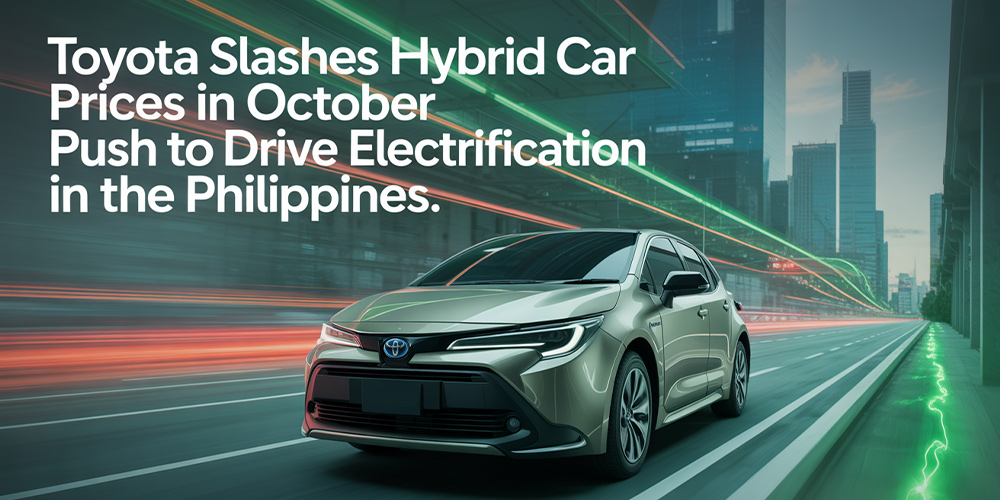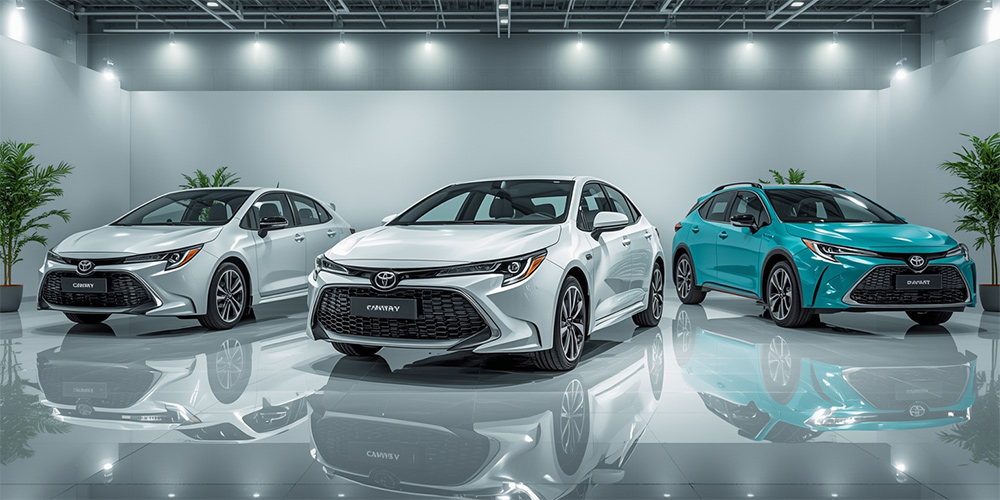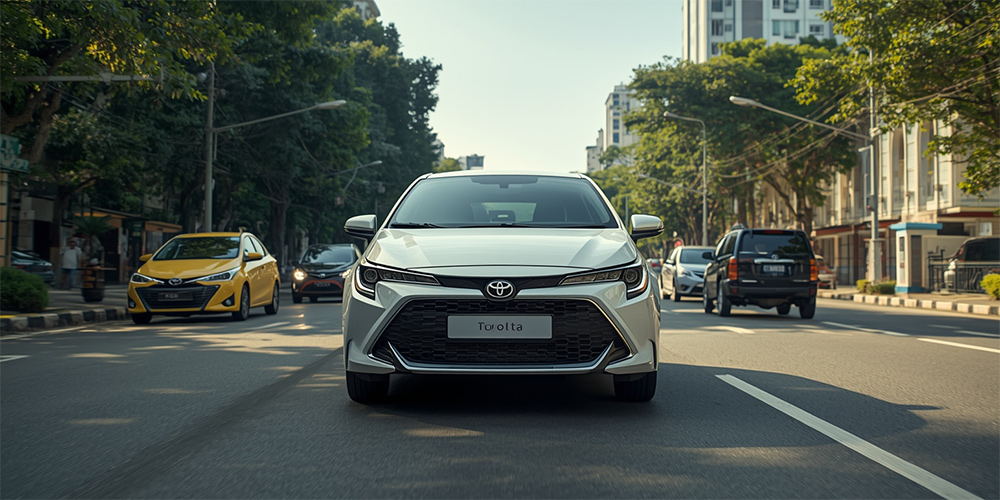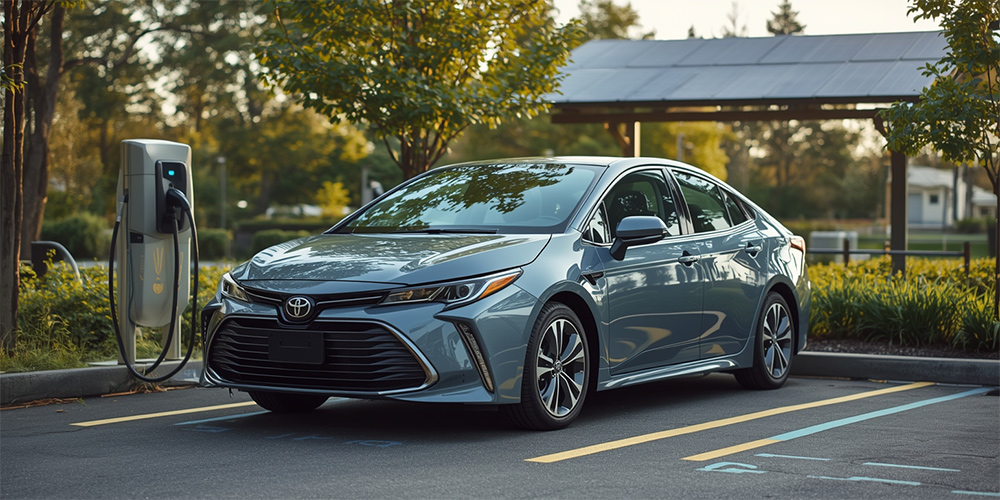
Toyota Motor Philippines (TMP) has launched one of its most aggressive pricing initiatives yet, cutting the cost of several hybrid electric vehicle (HEV) models by as much as ₱300,000 this October. The move comes amid intensifying competition in the country’s electrified vehicle segment and growing consumer interest in sustainable mobility.
The limited-time offer, running through October 31, 2025, covers popular hybrid models including the Corolla Altis Hybrid, Yaris Cross Hybrid, Camry Hybrid, and Corolla Cross Hybrid under the campaign banner “Electrifying Deals.”

While much of the global auto industry shifts toward fully electric vehicles, Toyota continues to emphasize hybrid powertrains as a bridge technology — particularly in developing markets like the Philippines where EV infrastructure remains limited.
In a statement, TMP said the October promotion aims to make electrified mobility “more accessible to Filipino drivers” by reducing entry barriers to hybrid ownership. Dealers nationwide are offering a combination of cash discounts, low down payments, and reduced monthly amortizations, depending on the model.
A ₱300,000 reduction on certain trims brings hybrid pricing closer to their gasoline counterparts, addressing one of the biggest deterrents to adoption: upfront cost. For example, the Corolla Altis Hybrid, previously priced at around ₱1.67 million, now dips nearer to the ₱1.4 million mark in some dealerships after incentives.
TMP executives have long argued that hybrids remain the “most practical and scalable” electrification solution for the local market — requiring no charging infrastructure while still delivering lower emissions and improved fuel efficiency.
Toyota’s pricing move comes as the Philippine automotive market braces for a new wave of electrified vehicles. Korean brands like Hyundai and Kia are ramping up EV visibility ahead of the upcoming Philippine Electric Vehicle Summit later this month, where the Kia EV5 will make its public debut.
Chinese automakers such as BYD, GAC, and MG have also increased their footprint with plug-in hybrids and battery electric models, leveraging aggressive pricing and technology-heavy feature sets.
“Toyota’s discount program looks like a pre-emptive move to defend hybrid market share before EV prices begin falling,” said automotive industry analyst Miguel Alvarez of MetroDrive Research. “They’re trying to lock in consumers who want lower emissions but are not yet ready for the full EV jump.”
According to data from the Chamber of Automotive Manufacturers of the Philippines, Inc. (CAMPI), hybrid vehicle sales grew by 28% year-on-year in the first half of 2025, even as fully electric vehicles still represent less than 2% of total car sales. Toyota remains the dominant player in the hybrid segment, accounting for more than 80% of all hybrid sales in the country.

Despite rising interest in electrified cars, industry observers note that affordability and infrastructure remain key obstacles to faster adoption. Although government policy has exempted EVs and certain hybrid types from excise tax under the Electric Vehicle Industry Development Act (EVIDA), high sticker prices and limited charging facilities outside Metro Manila have slowed momentum.
By cutting hybrid prices, Toyota may be testing consumer elasticity — measuring whether a lower cost of ownership can offset infrastructure concerns. Unlike fully electric vehicles, hybrids operate seamlessly on gasoline while supplementing energy through regenerative braking, making them ideal for regions with inconsistent power supply or limited charging access.
Consumer response so far appears positive. Dealerships in Metro Manila and Cebu report increased foot traffic and inquiries for hybrid models since the campaign launch on October 1. A Toyota Quezon Avenue sales executive told AutoFocus PH that hybrid inquiries “jumped by almost 40%” in the first two weeks of the promo.
From an environmental standpoint, Toyota’s campaign could accelerate reductions in carbon emissions within the country’s vehicle fleet. The Department of Energy (DOE) has set an ambitious goal of achieving 10% electrified vehicle share by 2030, a target that would be difficult to meet without strong hybrid adoption.
Hybrids also serve as an entry point for consumers transitioning toward more sustainable driving habits, educating the market ahead of a more widespread EV rollout. TMP’s move may therefore complement national goals while strengthening its position as a sustainability leader in the local automotive landscape.
Financially, analysts believe the short-term revenue impact of discounted prices could be offset by volume gains and improved brand loyalty. “Toyota has the capacity to absorb margin compression in exchange for market stability,” said Alvarez. “They’re signaling long-term confidence in hybrid dominance.”

The next few months could prove decisive for Toyota’s hybrid leadership. With global supply chains stabilizing and more EV brands entering the country, consumer expectations are shifting rapidly. The automaker’s hybrid-first approach remains pragmatic — but as competitors bring in cheaper electric options, Toyota may need to accelerate plans for full-EV models in the Philippines.
Industry insiders hint that the company could preview an electric version of the Corolla Cross or Hilux within 2026, aligning with Toyota’s global electrification roadmap. For now, however, hybrids remain the company’s most immediate and practical tool for greening Philippine roads.
Since 2012, KG Car PH has been the go-to for affordable car parts in the Philippines. We make it easy to find the right fit and offer same-day delivery nationwide—so you get quality parts fast, without spending more.
SOCIAL MEDIA
TOP CATEGORIES
QUICK LINKS
HELP
support@kgcar.ph
© 2025 KGCAR.PH